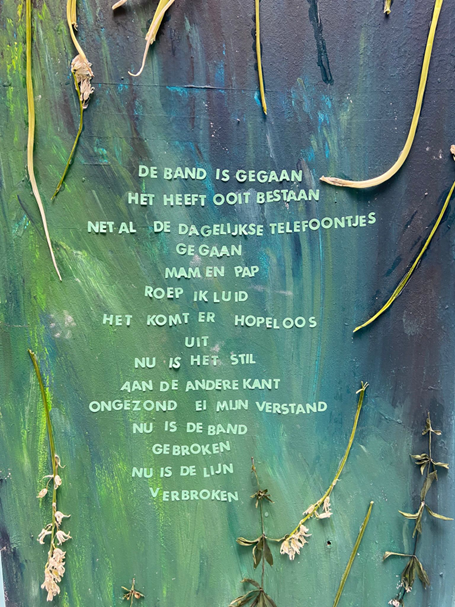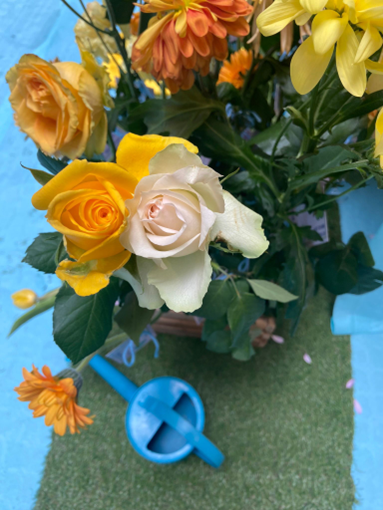For English scroll down
Rouw wordt vaak geassocieerd met het overlijden van een dierbare, maar het begrip is breder. Femke legt uit: "Rouw gaat niet alleen over overlijden. Je kunt ook rouwen om het verlies van contact met een ouder, familielid of vriend." Tijdens haar derde jaar liep zij stage bij een uitvaartorganisatie, waar zij voor het eerst intensief in aanraking kwam met rouw en rouwende mensen.

Tentoonstelling als afstudeerproject
Femke vertelt: "Tijdens mijn stage merkte ik hoe ongemakkelijk het onderwerp rouw nog steeds is, bij mezelf maar ook in mijn omgeving." Daarna volgde ze de minor Beroepsmatig omgaan met verlies en rouwsituaties en besloot ze rouw centraal te stellen in haar afstudeerproject. Haar hoofdvraag was: 'Wat hebben studenten van Hogeschool Rotterdam nodig wanneer zij rouwen en tegelijkertijd studeren?'
Femke interviewde vijf studenten over hun ervaringen met verlies. Een van hen zei: "Je voelt je vaak alleen, alsof niemand echt ziet wat je doormaakt." De behoefte aan erkenning, een luisterend oor en toegankelijke informatie over rouw bleek groot. Femke verwerkte deze verhalen in een tentoonstelling, waarvan beelden in dit artikel te zien zijn.
Rouw is geen fase
Over de modellen die ze voor haar onderzoek bestudeerde, vertelt Femke: "Het duale procesmodel sprak me het meest aan. Het laat zien dat verlies en herstel elkaar afwisselen, als een slingerbeweging. Veel mensen denken dat rouw een fase is die je af moet ronden, maar ik wil juist laten zien dat rouw en herstel naast elkaar kunnen bestaan." Tijdens haar stage bij de uitvaartorganisatie kreeg ze een ander perspectief: "Ik zag dat rouw ook een uiting van liefde kan zijn. Het is zwaar, maar het bevat ook iets waardevols."
Tijdens haar stage bij de uitvaartorganisatie kreeg Femke een ander perspectief op rouw. Ze zag hoe rouw ook een uiting van liefde kan zijn. Het bracht haar het inzicht dat rouw, hoe zwaar ook, ook iets waardevols kan bevatten.
Meer dan alleen overlijden
Femke benadrukt het belang van aandacht voor diffuus verlies: "Verlies is niet altijd het overlijden van iemand. Soms verlies je iemand zonder afscheid, bijvoorbeeld door het wegvallen van contact. Daar is in onze samenleving nog weinig ruimte voor."
Ze vervolgt: "We leven in een cultuur waarin verwacht wordt dat je snel weer meedraait, maar juist bij verlies is het nodig om stil te staan." Ook het bespreken van rouw blijft moeilijk, merkt ze op: "Het is nog steeds een beladen onderwerp. Vooral mannen krijgen vaak het idee dat emoties tonen zwak is. Terwijl rouw allerlei emoties kan omvatten: verdriet, boosheid, opluchting, verwarring. Alles kan er zijn."

Erkenning van gevoelens helpt
Binnen de hogeschool vond Femke geen specifieke plekken waar studenten naartoe kunnen om stil te staan bij rouw. Wel ontdekte ze studentenpastoraat010, dat workshops over rouw en verlies organiseert. Toch blijft de drempel om hulp te vragen hoog: "Veel studenten weten niet waar ze moeten beginnen. De stap naar een decaan of hulpverlener is voor velen te groot." Uit haar onderzoek blijkt dat simpele erkenning al veel kan betekenen: "Erkenning door docenten en medestudenten kan het verschil maken. Gezien en gehoord worden helpt in het rouwproces."
Rouw heeft ook impact op de studie, vertelt Femke. "Sommige studenten lopen vertraging op of stoppen tijdelijk, ik ook. Voor mij hielp het om stil te staan bij wat ik had meegemaakt en mezelf de ruimte te geven om te rouwen. Een gesprek met een decaan kan dan ook heel helpend zijn."
Met haar project wil Femke het gesprek over rouw openen. Haar oproep is duidelijk: "We moeten meer aandacht geven aan rouw, meer kennis delen en vooral meer ruimte maken voor studenten die rouwen."
Hulp bij studie
Soms kun je wel wat hulp gebruiken tijdens je studie. Bijvoorbeeld als er iets gebeurt in je leven dat invloed heeft op hoe het gaat met je studie. Of wanneer je ergens tegenaan loopt en extra begeleiding nodig hebt. Of het nu om iets persoonlijks gaat of iets dat met je opleiding te maken heeft, Studentenwelzijn is er voor jou.
Stilteruimtes
Op de hogeschool zijn er op verschillende locaties stilteruimtes waar je terechtkunt voor rust, bezinning of een moment voor jezelf. Op Hint vind je een overzicht van waar deze ruimtes zijn.
Mourning and studying
What does it mean to grieve?Student editor Arson talked to Femke, a graduate of the Leisure & Event Management study. With her graduation project: 'Prouwd & Grouwth', she wanted to provide a positive element to grief and share her knowledge light-heartedly.
Mourning is a broad term and is often associated with the death of a loved one. But you can also grieve for someone who is still alive, for example, if you have lost contact with your family. That's how Femke thinks about it. Within her study, there is much room to go in different directions. For example, in her third year, she opted for an internship at a funeral organization and came into frequent contact with grief and grieving people.
Exhibition
This internship inspired her to think more about loss. During her internship, she noticed that she found it very uncomfortable to talk about grief, and those around her also became aware of this. After this experience, she followed the minor 'professional dealing with loss and grieving situations', which gave her the idea to choose grief as a graduation assignment with the research question: 'What is the need that Rotterdam University of Applied Sciences students have while they grieve and study at the same time?'. To this end, she talked to several students. Many students lack recognition, a place to share their stories and become knowledgeable in dealing with grief. Students indicated that they did not feel heard by the University because they did not know where to go, and teachers often did not know how to deal with this. She interviewed five students about their stories concerning loss and incorporated them into an exhibition. Several images from the exhibition are in this article.
A grieving process does not stop. It never stops
There are many ways and phases that people go through in their grieving process. The dual process model of grief particularly appeals to Femke. Within this model, there is a lot of variation between emotions and the emotions that someone goes through. Similar to a pendulum movement because feelings of loss and recovery alternate. She noticed that many people who are grieving have the idea that they must go through all the standard stages of grief and then be done with it one day, while she would like to tell people that recovery and loss can coexist.
During her internship at a funeral organization, she encountered grieving people, which put her in a completely different world, where she became much more aware that there is more than just the now. As a result, she also noticed that grieving can be something beautiful. To her it symbolizes the love that people can express.
Through the research, she also noticed that the way most people in the Netherlands grieve differs from other cultures. When someone dies in the Netherlands, the funeral will often occur within a week, and there is little talk about mourning. In addition to loss due to the death of someone, she also speaks of diffuse loss, also known as loss for which you do not receive condolences. She notices that very little attention is paid to this because we are always busy, while loss requires stillness. There is no room for that yet, she says, because one is required to be able to participate again as soon as possible. It is hard to talk about feelings like these with those around you. Grief is still a loaded subject. Showing emotions is also seen as weak, especially among men, which limits the space to be open about grief. When grieving, all kinds of emotions can arise, from sadness to relief and much more...
Acknowledging feelings helps
She has not found any places at the college where students can go to mourn. She did come across the organization 'studentpastoraat010', which facilitates workshops on grief and loss. Yet the threshold for going directly to a dean or another party is still high for many. Femke's research shows that recognition of feelings by teachers and fellow students can enormously help in a student's grieving process.
In some cases, students also stop their studies or are delayed due to a loss, including Femke. Taking a moment to pause and take space to grieve helped her. Her research shows that the dean can think with you about this.
Femke's call is to pay more attention to grief and continue to share knowledge about it.
